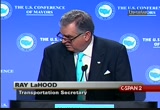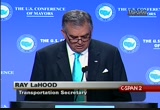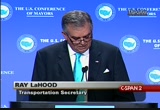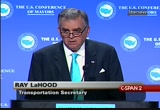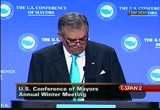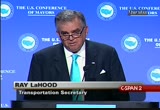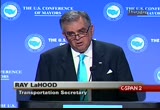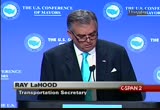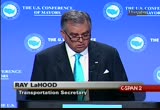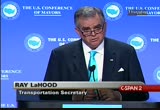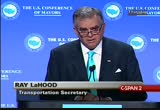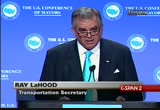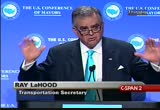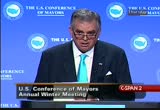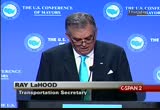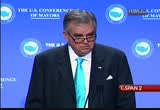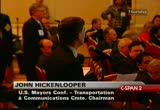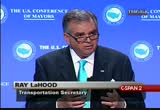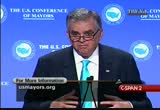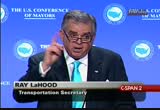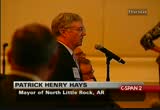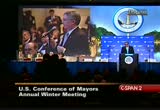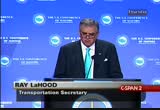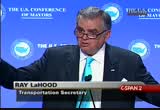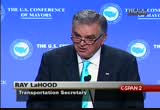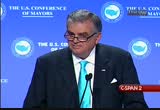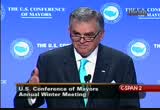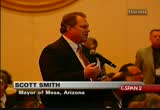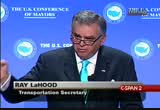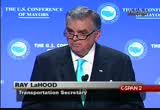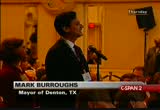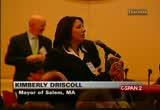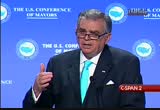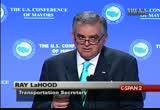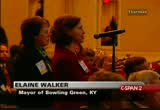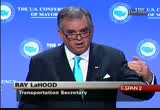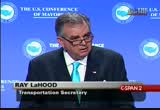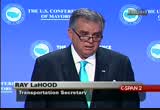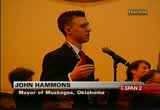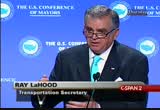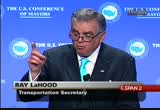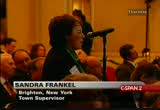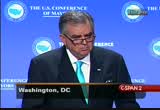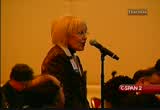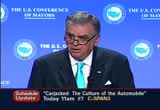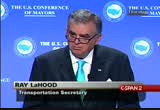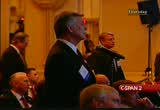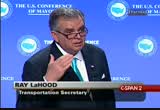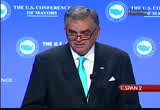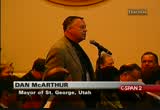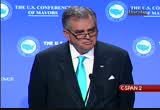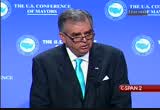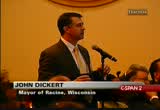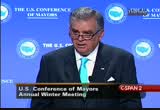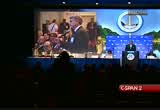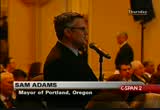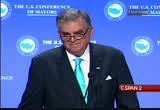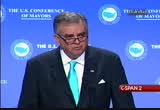tv C-SPAN2 Weekend CSPAN January 23, 2010 7:00am-8:00am EST
7:00 am
7:01 am
liz, thanks so much for that lovely introduction and highlighting some of the things that we have worked on with all of you folks in this room during the last year. i too want to compliment david agnew. he and i have been full partners in really making sure that the voices of the mayors and other local elected officials have been heard here in washington. he does a great job and i really enjoyed working with david and to you, tom, thank you for your leadership. always in what you do to be so helpful to the mayors. and i want to -- i know that the chairman of the nea is here. rocco, where are you at? please stand up. the chairman of the nea has joined us. he's a part of president obama's team. and we're delighted he's here. he and i just had a meeting recently. and we're going to collaborate on some things for really
7:02 am
promoting the arts because we know that the cultural activities in communities are so important to the work that all of you do. i'm going to make some very brief remarks and spend most of the time with you on any questions or comments or issues that you would like to talk about. i think it's more important for me to listen to you. so i add my welcome to all of you, to washington. i think it goes without saying that you all have some of the toughest jobs in america. we think of the jobs that exist here in washington, whether it's the president or vice president or members of the cabinet. but you're on the ground every day. you're in the neighborhoods. you're with real people. and nobody knows more than you do that the real -- the needs of america. and so i'm just really delighted to have a chance to be with all
7:03 am
of you and to listen to you. i know the recession has taken a great toll. we think we've tried to -- we have made a difference at the department of transportation. i want you to know -- i know you know this and i know you'll hear this this afternoon. but president obama and all of us at the administration are redoubling our efforts this year to find new ways to grow the economy and create the jobs your communities depends on. as most of you know, i traveled last year to 66 cities. and i met many of you. and i've seen some of the amazing things that you're doing in your communities and some of the amazing products that are transforming sprawling, 21st century cities to green, clean accessible hubs of activity where people choose to live and work and start a family. i'm going to cite a couple of these. i couldn't do all of them. but i was in chicago with mayor
7:04 am
daly who i know is at a meeting with some other mayors from illinois with senator durbin this morning. but garfield park is getting a new lease on life thanks to the transit stop that connects families, workers, job seekers and the chicago l and the rest of the city. and i was with my friend john hickenlooper, i think, for the third time like. and this is just a little suggestion. when john learned that i was going to be in denver with a meeting with senator bennett on a job summit he was having he invited me for dinner. as you know, john is a restaurateur and i had no idea that we were going to have dinner at his home and that his wife was out for dinner somewhere else. so this is a little clue for all of you, okay? when i come to your community, john actually cooked dinner. [laughter] >> we had -- we had a wonderful
7:05 am
steak done -- cooked perfectly, medium rare for both of us. and salmon and a salad and a bottle of wine. this guy is not only a fantastic mayor. he knows something about the restaurant business. we had a great time in denver. on a previous visit there, i visited union station. and i know that john and others in the metro denver area have worked very hard on this. so we appreciate the leadership of john hickenlooper, the mayor of denver. i guess, maybe a year from now when i visit there, maybe he'll be cooking something for me at the governor's house. i don't know. but we'll see about that. [applause] >> now as a republican i'll probably get in a lot of trouble for saying that. [laughter] >> but i like john very much because of his leadership. and one of the things that he has done that i know so many of you have done is really pulled people together.
7:06 am
and gotten a lot of other mayors in the denver metro area to work together. not on behalf of denver but on behalf of the people. and that's the way -- and i know all of you know this. that's the way you really solve problems and get things done. i was in dubuque at the historic millworks area. mill work district, and got a chance to see what they're doing. and transforming that whole neighborhood into a really liveable neighborhood. ibm will relocate 1500 people to dubuque. and when i asked the ibm people on my visit there why 1500 people into dubuque. they said this is a great community. it's a liveable community. and what that infusion of jobs has meant to the mill work area in terms of transforming it is quite extraordinary. early on, more closely to the time after i was sworn in, i was in phoenix. and i had an opportunity to be a
7:07 am
part of really looking at the light rail system. i've been to new orleans. met with the people that are refurbishing the street cars there. so the idea of liveable communities is catching on all over america. you all get it. you are the incubators for lots of creative ideas to help people stay in the communities because there will be walking paths, biking paths because there will be light rail, good buses. we know we're -- people are always going to have a car. we know that. we also know that we have a state-of-the-art interstate system in the world. but people are looking for more. they're looking for alternatives. they're looking for different options. and that's what all of you are creating. and i've seen it in the 66 cities that i traveled to last year. and i hope all of you are as pleased as i am at the partnership that we have developed now with our friends
7:08 am
at hud and epa. we now have shared resources between hud, epa, and d.o.t. to really create the opportunities for liveable communities. shaun donovan and i and lisa jackson met early on about the idea of how we're going to work together to help create and work with all of you on the things that you want to do. and this is a great collaboration. this is the administration that really does do what all of you do, work together in a collaborative way. and it's proving to be very, very successful. i think, i know, and i think all of you know this, our portion of the recovery act, the $48 billion has made a difference in your communities. [applause] >> and i don't care -- look, i don't care what stories have been written. the stories that have been written saying that it hasn't created jobs is baloney.
7:09 am
and i said that to a denver to a reporter. one year ago i was on job sites talking to people who were on unemployment, maybe welfare because they didn't have a job. and after the president signed the american recovery and reinvestment act people went to work. and i see orange cones and orange barrels all over your communities. and i know people are working. i think it's a good sign. it's a good signal. and we worked hard with all of you to make sure the money was spent correctly, by the book, no boondoggles, no sweetheart deals, no earmarks. you've never seen a story written about the fact that the money wasn't spent correctly. there have been stories written about the fact that, you know, it hasn't been effective.
7:10 am
it has been effective. and you all have certainly been a part of that. i know there's a great deal of interest in our tiger program, discretionary money. by law we have to make an announcement by the deadline. we completed -- just about completed our reviews. lots of innovative, creative opportunities from all of you. before i came here this morning, i met with senator durbin, who's the senate assistant majority leader. the number two democrat in the senate about the jobs bill that has already passed the house, the second jobs bill. and i encouraged senator durbin. i think all of you have already done this. but if you haven't, to your own. this tiger program -- this discretionary money allows all of you to have direct access to
7:11 am
money to do innovative, creative things in your community. and when you see the announcements that we'll be making, you'll see a lot of dreams and a lot of opportunities will be created. and so we think that should continue in the next jobs bill and that's what we were encouraging senator durbin to include in the next jobs bill. not just opportunities for the kind of money that we know that will go to the formula programs, the state, the d.o.t.s that we have a great relationship with. but creative ideas and innovative ideas. and so we hope that the congress will put substantial dollars into the tiger -- in the next tiger program 'cause if they do, it'll be -- it really will be money well spent. it goes directly to all of you. for the kind of things that you need that you simply don't have the resources for. [applause] >> so i know you'll all be
7:12 am
talking to your friends on capitol hill about that. i'm not supposed to tell you to lobby. but as politicians all, you know what to do. i'll leave it to you to do that. finally, let me just say that i have said time and time again when people have tried to criticize d.o.t. and the administration on this idea that we don't want an authorization bill, the president does want an authorization bill. he wants a strong, robust, comprehensive transportation bill for america. he gets it. when he was a united states senator, senator obama and i as a member of congress and our delegation from illinois worked very hard to transportation issues. after he became president, he said to the congress, we have to have a very strong infrastructure component in the economic recovery program. $48 billion. not insignificant. and so the president gets it. he wants a good bill.
7:13 am
he wants a comprehensive bill. he wants a robust bill. we're going to work with congress on that. our dilemma is trying to find the $400 billion or $500 billion. if you look at chairman oberstar's bill which is a good bill by the way. it includes many things that we want to do. it is a good bill. it costs between 4 and $500 billion. that is our dilemma. that's what we have to work with congress on to try and find the resources to do that. we know that the highway trust fund is inadequate. people are driving less and they are driving more fuel-efficient cars and so we talked about thinking outside the box on how we fund these things. if you have any ideas on this, we certainly are willing to listen. but the idea that the president doesn't care about having a good, strong transportation program is not is nonsense. i.e., the $48 billion that we shoveled out the door here over the last year. and the fact that he's pushing congress to do another jobs bill.
7:14 am
so we're going to get a good bill. and it will be a very strong comprehensive bill. and it'll have to be paid for. and that's what we really need to work with congress on. so again i'm delighted to be here. i wanted to spend most of our time together listening to your concerns and questions. so that i can take them back. one time also going to be with you this afternoon when you have a chance to see the president. i'll be sitting in the back row just in case you try and ask any questions that maybe -- anyway, i'll be around that meeting, too. [laughter] >> thank you for coming to washington. this is an important meeting. it's an important time. you all know that. particularly, with where our economy is at. we all can make a difference. i think we've proven to you you have a full partner at d.o.t. you really do. the move that we made on making
7:15 am
sure that new start transit programs comes from -- that idea came from all of you. that it takes too long to get a new starts program going. and there ought to be other criteria including liveability. and we took your idea. and we changed that program. and that will help -- that will help everybody. it really will. it will help us speed up our process. and it will help you get the kind of dollars you need to implement the programs that will really make a difference in your communities. so i think that's an example as well as the fact that i've been to 66 cities as well as the fact that we're collaborating with other departments like hud and epa and energy to really jumpstart our economy and jumpstart our opportunities to continue to be the incubators for great ideas, not only for transportation but for energy and for housing and really
7:16 am
having communities that have the clean air that, you know, that people have really come to expect. so i look forward to your questions. and whatever comments any of you might have. thank you very much. [applause] >> is it possible to turn the lights up a little higher or not? i don't know if we can or not. i'd like to be able to see these people a little bit better. mayor, thank you for the lovely dinner. [laughter] >> that was my pleasure. >> as good as a dinner as i've enjoyed in a long time. trust me i was so glad that he showed up the next day at the jobs summit without any indigestion or food poisoning. [laughter] >> i wanted to -- and make sure we talked about this yesterday in the liveability meeting we had yesterday afternoon just how unique it is to see the secretary of hud, the secretary
7:17 am
of transportation, the head of epa meeting on a regular basis and integrating their efforts. and when we look at this room, right, we have republican mayors, we have democratic mayors -- each of us in suburbs or in downtowns -- really the transportation becomes one thing that helps pull us together. and we all agree that we need to find better solutions wherein our citizens don't get stuck in congestion and that we do have affordable housing close to transit where working people can get to a variety of jobs. how can we be more helpful to the department of transportation in putting these ideas out. i know many have lobbied their chamber of commerce and many have recognized to push for more allocations of transit and wider recognition of that. are there other ways that we can build on our partnership with the d.o.t.? >> i think the key to all of this -- and you know this so i know i'm speaking to the choir.
7:18 am
but as i've gotten around the country and seen what you're doing -- i just met with the mayor of providence on a very important project, where there are good projects, there's collaboration. where other mayors -- suburban mayors are willing to set aside their own agendas and own egos and come together around the idea that if people with unified, that if people work together -- look, there's not enough money to give to every community in america so we have to really have communities that are willing to work together, to come together to develop a comprehensive plan. i think when you see the kind of opportunities that are created through the tiger program, these are opportunities where there's very good, strong collaboration between a number of communities. and one of the reasons we wanted to change the criteria on transit and other opportunities for light rail and transit and buses and so forth is so we can
7:19 am
encourage people to work together. the formula for this is people working together, coordinating together, setting aside their own egos and their own agendas and coming together. i know the mayor of orlando is here. i was in his community last year. i was asked to go there. 'cause they want to get in the high-speed rail business. and we're going to be making those announcements very soon. the president and vice president -- this is their dream. but i went there and what i said to a room of people about this size -- you got to get your act together, which is the same message i had for the people when i was asked a question in atlanta. how do we get in the high-speed rail? you have to get your act together he. there is not enough money to do all the things we want to do in every community and every region. so y'all have to work together. you have to be the leaders on this. you have to get the people in the room. you have to use the influence of your office.
7:20 am
if you do that, you will be successful in our eyes. that's the first step. and you'll be able to submit the kind of dream opportunities where people are working together. and the reason we're doing it at our level between shaun donovan, lisa jackson, steve chu and others is because we know there's not enough money at the federal level unless we pool our resources. if you do that, pool your ideas, you will be successful. and you'll have good partners in washington in this administration to help you. yes, sir. >> mr. secretary, my name is patrick hayes. i'm the mayor of north little rock arkansas. and this is my 22nd year in office. and we love transportation in our city. interstate 30 dead-ends into interstate 40 into north little rock. and we fund our parks just to give you an example, we fund our parks department with what -- what we call hamburger tax which
7:21 am
is prepared food tax and the highest grossing restaurant in our city -- and we've got our olive gardens and red lobsters and all sorts of -- the chains. but the one that funds most per seat is known as iron skillet. and that's at a truck stop in galloway which is a great operation. and it sure helps us out. we also have union pacific railroad as our largest private employer. a little over 2,000 jobs work out of our city with union pacific. and we kind of grew up as a railroad town in arkansas. so i say that -- we love our roadways. we love our waterways. we're on the mcklennan-kerr project. transportation is a large industry in our state. in fact, we're happy to say -- at least we are that caterpillar is going to be opening a brand-new road grater facility in north little lock i know their home headquarters was in your district. so any road graters that are going to be made in north america will have a north little
7:22 am
rock, we hope, tag on them -- at least that's going to be constructed. i say all that to say this, that in the future of our country, we're going to have a census next year and we're about 307, 308 million people and by the middle of the century it looks like we may be pushing somewhere in the neighborhood of half a million folks. well, our transportation system won't handle it. we've got to do things that are different. the obama administration -- we're excited about the innovation that it's looking at in terms of reprioritizing some of the funding that has gone on the past. i'm also chairman of the mayors amtrak advisory council and rail has been my passion for a long time. we have got to look at choices for the future. we have got to look at the investments and how they're going to give us our biggest return on our buck. and right now i think many of us believe around the country and the conference the mayors have been carrying this energy for a long time in terms of investment in rail. the $8 billion high-speed rail, you know, passenger rail is a big part of it. freight rail is also a critical part of it.
7:23 am
what is the department of transportation -- you know, what kind of plans that you have done with the $8 billion with the funds and investments in upgrading general rail transportation -- you know, to me that's the biggest investment. we hope you share that thought and i would sure love to hear your comments on it. >> thank you. thanks for all your leadership in arkansas. as i said, the president and vice president and other members of the cabinet will be making some announcements about high-speed rail. we think there are -- well, not we think. there have been some very strong proposals from many different regions around the country on high-speed rail. high-speed rail is coming to america. and it's coming to america because of the $8 billion, which is 8 billion than we ever add at d.o.t. because of president obama's vision and vice
7:24 am
president biden's idea. they know this is what americans want. and i think when you see the rollout of the high-speed rail regions, what you will see is the start not dissimilar to when the interstate system started five decades ago. not all the lines were on the map. and not all the money was there to pay for it. but here we are. with the state-of-the-art interstate system. and i think a few decades from now we'll have a state-of-the-art passenger rail system in america. [applause] >> so we have $8 billion that we'll be making announcements on. the administration will be soon. the congress gets it. they include it in our transportation appropriation bill. $2.5 billion, high-speed rail. so that's in additional money that we'll be looking at,
7:25 am
spending throughout this fiscal year. and the other part of it is, we gathered all of the people that are interested in making train sets and providing infrastructure for high-speed passenger rail. we gathered them in a room in washington. and we said to them, what we don't want to happen is -- we use the taxpayer money to get high-speed rail going and then we have equipment built somewhere else. we want it built in america by american workers. [applause] >> so we have companies from other countries, france, spain, germany and asia in america today looking at facilities. looking at opportunities where our train sets and our infrastructure can be built in america. and it will be.
7:26 am
and it'll be using our workers who know how to manufacture. and that will be a real boon, i think, to our economy and send a good message that our people know how to -- you know, how to build trains. and also the infrastructure for that. so we're just at the starting point. but the future is very bright for this. >> yeah. i've got three grandchildren i'll just leave with this. and i know that they'll be in their productive years in the 40s and 50s. and if we don't get started now -- and we appreciate the beginnings, the strong beginnings of the obama administration -- starting now is an absolute essential. and the conference of mayors, as we are in all of our different parts of the country, are ready to be good partners. thank you. >> thank you. yes, sir. [applause] >> mr. secretary, thank you for being here. i was already in line. you've answered a lot of the questions about high-speed rail.
7:27 am
i would like to compliment you on polly trauenberg who represent you very well. i'm on the end of that barbell on mayor dyer in clearwater hoping for that high-speed rail. i just wanted to know how other monies were going to be appropriated after this $8 billion but you answered we have stone crab and grouper for you as soon as you want to bring that money to florida. >> i'll be there. [applause] >> yes, sir. please. >> mr. secretary, thank you. scott smith mayor of mesa, arizona. thank you for your visit. and we have a bidding war now so you can out hooken looper. -- hickenlooper. i can outcook hickenlooper any day.
7:28 am
i believe mesa is the first one to apply under small start of what i with a small extension that comes to downtown and we're ecstatic -- >> congratulations on that. >> we think we met it. otherwise we're going to blow it off the starts with the new standards so thank you very much. one question i'd like to ask about is -- you've talked a lot about mpos and about some reformation that might need to come from mpos and i think one of the things that's come out through the stimulus and how the dollars have flowed is it's accentuated maybe some flaws but some deficiencies in that cities are not being able to make the type of decisions and the flow of funds directly to cities is certainly been affected by the mpo system as we have now. what kind of specific ideas or proposals would you have to reform mpos in how cities can become more directly involved in those decisions? >> i mean, i like the approach that mayor hickenlooper, that mayor daly and other probably big cities -- where they have
7:29 am
really reached out to mayors all over their region to work together. and to use the mpo to help them develop the kind of regional plans that you have to have for light rail or for transit or for buses or for walking paths or biking paths. you kno%, these things just can't end at the city borders. we know that people are living in rural parts of, you know, of cook county, for example. and so we want to work with this organization. we want to work with mpos. to get to the kind of reform that can be inclusive. that people feel like they really have a stake. that it's just not one or two of, you know, the big players and everybody else is out there kind of fending for themselves. i think that's the direction that we're going. and we're taking our cues from some examples that are taking place across america.
7:30 am
but we're open to some good ideas right now. again we're at the starting point in this. we know there needs to be some reform. the mpos know that and all of you that are in this room that are elected by the people know it, too. and so i think we'll come up with a real good mpo reform that will reflect what all of you feel is necessary so that you're in the game. and you're in the room. and you're a part of the decision-making. that's what we need to get to. >> thank you. and peoria to mesa is one of the popular routes. >> peoria, illinois to mesa, arizona. >> how do you do, mr. secretary. i'm the mayor of the city of denton, texas and we're at the point of dallas/fort worth and the point of the triangle of denton. we are about a little over 10 years ago decided to bypass new starts because of the barriers to success that that program had.
7:31 am
and we created our own county transit authority to connect the dots between denton and metroplex dallas in particular in darp and that's working for us. one of the risks that we're facing now, however, in great measure we're counting on the transit-oriented development around the stations in the future to justify our heavy investment in creating our own transit authority. however, that is now at risk, in fact, financing has become so unsteady. a lot of the projected development has been pulled off even though we're right -- we're at the point of -- within a year or so having these transit stops open. and so what i would ask and would encourage is whatever can be done to help stabilize financing opportunity, federal guarantees for the transit-oriented development to allow those to occur. because the effect of that
7:32 am
development is just absolutely tremendous, both locally and for the future success of the transit stops themselves. >> i appreciate that. thank you. >> thank you. yes. >> hello, mr. secretary. i'm kim driscoll and i'm a mayor of salem, massachusetts, small city just north of boston. thank you for being here. you clearly get it. thanks great. one quick point we're one of the many cities who have tiger grants in and glad to hear they are going to come out on time. they are great projects and i'm excited that those things will move forward. one plea we are looking at the tiger grants and transportation funding as important as the road networks, the bridges, the public transportation, the high-speed rail is -- if we can't completely leave port development and the waterfront out of that equation -- for a city like salem we're small and historic at one time we had a larger port than boston. the first millionaire in america hailed from salem, massachusetts, made their fortunes out in the waterfront.
7:33 am
we want to take advantage of that waterfront. we don't have an interstate or highway success. it's also a great way to get in and out of boston, commuter traffic and i'm hoping as we think of federal funding for transportation that there is a small portion that can be dedicated to port development. we have a lot of working water fronts. they're typically older urban historic areas and it's one way certainly to maximize revenues and get people to work in a very efficient way. do you have any thoughts on whether or not that's going to be part of the equation. >> sure. i think if you were to talk to members of congress who put together the economic recovery plan, one of the reasons they put the tiger -- we call it tiger, but the discretionary money there was because there really was no other opportunity for ports and i think when you see our announcements as they're made, there were some very strong port proposals. and, you know, there was 28 billion for roads and bridges and waiving billion for transit.
7:34 am
8 billion for high-speed rail. a billion for airports. but, you know, no really specificity for ports. and so we looked at the 1.5 as an opportunity. if you look at our guidance, you know, in terms of multimodal and other opportunities so i think you'll all be -- you know, those of you who are interested in ports and port opportunities will be very pleased with -- we were pleased with the proposals we received. >> i'll take that as a yes? [laughter] >> it's a yes on the idea that we get it when it comes to mortgages >> all right. all right. that's good. >> yes. >> secretary lahood i'm elaine walker from bowling green, kentucky. we are thankful in kentucky for the money that we've gotten from the funds. however, we are the third largest -- arguably the third largest city in kentucky. and after the funds came in, the surface transportation funds came in for louisville and
7:35 am
lexington, a city the size of bowling green received zero dlargs. -- dollars. and the reason is it becomes political and it's much more expedient to get it in the areas where you've got a re-election going on. in future funding, how do you feel about the type of infrastructure that the block grants have provided us in cdbg, in the energy efficiency and conservation block grants that would allow cities over the size of 50,000 direct access to some of those funds so that, you know, a city like bowling green, which was in the top 9% in terms of real growth in terms of jobs and real growth in the nation so that we can move forward and have access to some of those funds? >> yeah. i think in the next jobs bill, if there is one, the house has passed one, which 38 billion in the house bill fs for the department of transportation, i think the point i was trying to
7:36 am
make to senator durbin today that i think needs to be made to congress is in order for cities, in order for mayors, in order for creative people in these cities to do the creative things that they want to do and fulfill dreams that they'd been dreaming about in their communities, the tiger program is the way to go. i mean, the reason that the $48 billion was structured the way it was, with $28 billion going to the states is because of our relationship with the states. the congress wanted the money out the door within 120 days or at least obligated. the only way that you can do that is with these relationships that we have with the d.o.t. and, you know, right after the president signed the bill, i met with a number of you. and i heard the complaints about the fact that we're probably not going to have access to this 'cause the state's going to decide. and our answer to it is tiger.
7:37 am
and we're going to encourage congress to step up again on tiger. 'cause it is the one way that the cities have direct access t. [applause] >> and so -- but if the congress again in another jobs bill, which i think they will, wants to get people to work quickly on projects that are ready to go, we have to use the state -- you know, the state system to do it. i know that, you know, y'all don't want to hear that. >> again, the state system did not work necessarily to get the money -- well, it didn't work to get the money to bowling green in the funds, the surface transportation funds. it did -- the block grant system worked very well for the energy efficiency and conservation block grants and cdbg. and even though, you know, 500,000 to my city means a great deal.
7:38 am
i know that we can decide how to use that money. and the grants are great but we're now in a pool with all the cities around the united states. so i really hope that you would consider a block grant formula is something that could allow cities as small as 50,000 to have direct access to some funds so that we could decide where it needs to go. >> well, congress will decide how this money is going to be structured. and i suspect that there will be a real, approximate ent-up demand with unemployment at still at 10% to really try to get it out quickly. i take your point and if we have anything to say about it, we'll make the case. i think the new jobs bill will be structured pretty much the current one is. >> thank you. >> yes.
7:39 am
>> mr. secretary, i appreciate you coming out and talking to us today. i was born in 1988 so i think the odds are good i'm the youngest mayor in the room today. and i appreciate getting to talk to you. i'm from oklahoma we're a town of 40,000 people just south of oklahoma. and our big thing is transportation. we really work hard to have that. we have all forms of transportation, the rail, highway, airport, you name it. we can do transportation. because i'm so young, i have seen people talk about transportation my entire life. what is the future of transportation in america? you talked about our interstate highways. those were started under eisenhower. what is the 21st century transportation method that america is going to be using? >> i think the future is about as bright as i've ever seen. i've been in public service for 30 years. i've worked around congress for over 30 years as a staffer. and a member of congress. i served on the transportation committee under very strong leadership.
7:40 am
i think when you look at the span of transportation in our country from when it was begun and certainly when the federal government got involved -- i don't know if there's another administration that has taken this kind of interest in america's infrastructure and america's transportation than president obama has. we have never had $8 billion for passenger rail. i don't know of another administration that listened as carefully as we did to all of you a year ago about the idea that you need the new starts money and it shouldn't take 100 years to get it. and that's a little exaggeration but you know what we're getting at. we listened to you on that. and now we're developing a new program where you can submit an application and a lot of the different other criteria will be used that will be helpful to all of you. and i think my point about the
7:41 am
president being for a strong robust, comprehensive authorization bill is true. and the proof of that is the $48 billion that we're spending out now as a result of the economic recovery and the fact that the president is pushing congress on another jobs bill of which we will receive an enormous amount of money. these dollars put people to work and help the infrastructure of america. because we have people like president obama, vice president biden and others in this administration that will work together to make sure transportation is of the highest priority of the program. >> i'm sandy frankel, brighton, new york.
7:42 am
many people think of new york city and the new york city metropolitan area as new york. but upstate new york is an area that has seen economic depression and real challenges over over the past few decades whether the country or the city of new york is experiencing a boom. and toward that end it will be critically important that upstate new york have access to high-speed rail in the first instance. louis slaughter hails from my area and represents a part of my town i think it's something it will really benefit a whole swath of communities across upstate new york. and then leading westward toward chicago. so i implore you to have that when you have your plan. the second thing i would like to
7:43 am
identify is the importance of universities and colleges as economic engines in the rochester area the university of rochester is the largest employer in the county. part in the city of rochester and the part in the city of brighton. and the infrastructure is inadequate to accommodate the university's planned growth which not only delivers medical, bio medical, bio tech types of research that we are moving for a mode for spinoffs and new companies to develop but we need funding for improvements in the interstate area near the university to accommodate that growth; otherwise, that growth won't be able to happen because the zoning and environmental reviews will show that the area can't support that.
7:44 am
from a traffic perspective so that's another issue. to think about our institutions of higher education as economic engines and the relationship of that to transportation infrastructure. thank you. >> yes, ma'am. >> i'm the mayor of the city of waco, texas and i would like to ask first of all of secretary lahood for being here and answering our questions. >> thank you. >> i would like to ask what the thinking is in terms of long term funding for highways and bridges and the use of a concept of users of the one that pay. we know the gasoline tax is not taking care of in keeping up with the needs. i'm wondering if there's any consideration or any serious consideration about this being a
7:45 am
factor of those who use the roads, a factor of weight and distance so that those who are using the most are paying the most for those roads and bridges. >> well, i think when you watch congress and see congress as the authorization bill gets played out, there'll be a great deal of debate about how we fund all of these things. and we certainly will be players in that. the president has made it very clear he's not in favor of raising the gasoline tax when there's 10% unemployment in america and so many people are out of work. but we've talked about the infrastructure bank as a way to fund big projects in america. you are in communities where tolling -- you can raise a lot of money with tolls and i know it's controversial in some places in the country but in some places people have raised a lot of money in order to add an additional lane onto a road or
7:46 am
build a bridge or fix up a bridge or whatever. so there are probably three or four different things that congress will debate. and certainly, you know, i think if you talk to people in the trucking industry, who use a lot of the interstate systems around america, they pay a pretty good chunk of tax into the state coffers for the use of the roadways but all of these will be part of the debate in congress. >> thank you. >> we want to applaud the obama administration's commitment to high-speed and passenger rail. you mentioned earlier there's two rounds of funding for the high-speed rail. is it the obama administration
7:47 am
intention to provide long-term funding for planning and development for high-speed and inner city rail corridors for the u.s. -- >> i think when you see the announcements that the president will be making about high-speed rail and others in the administration, we know that there are -- in every region that submitted proposals to us -- everyone is different. they're in a different phase. you all in california have been working on passenger rail for a long time as have folks on the northeast corridor. some places in the country are just at the starting point where they need planning money. what we're going to try and do is use the resources to really jumpstart opportunities around the country, not just in one part of the country but around the country. some of it will be for planning and some of it will be putting train sets on tracking. and so the way that we've evaluated the proposals is based on what the needs are in different regions of the country.
7:48 am
and so, you know, i think -- i think when you see the announcements you'll see that it will go for different -- you know, different iterations depending on where people are at in those regions of the country. >> i think under the transportation bill for the next reauthorization, are we going to -- is there a commitment to provide long-term funding? >> for high-speed rail? >> yes, sir. >> that will be up to congress. what i said earlier was that in our appropriation bill for transportation, which has been signed now -- there's $2.5 billion for high-speed rail that we will have. that's in addition to the 8 billion that should be a mall to all of us get it. that it's a priority for obama and vice president b based on the fact that there's 2.5 billion in our appropriation that congress sees it as a priority.
7:49 am
>> thank you. i also want you to understand there is not enough money in washington to do all the things we want to do with high-speed rail. we need private dollars. -- we need some private dollars and that's why i gathered all the people in the room that want to get in the high-speed rail building business, whether it's infrastructure, train sets or whatever because their private investment in america will also help jumpstart our opportunities. we need a good public partnership here. >> i just quote a small poem that makes my point. it isn't isn't enough to fill our pains with pains of silent praise nor is it enough to honor a person as a or confidence upward mounts ait's going to up to them to that person and telling them it counts. if a person does a job that you really admire don't leave a kind word unsaid and to do so might make them vain or cause them to
7:50 am
lose their head and tell them well done and see how it gratitude swells. it's not the flowers on the grave it's the living of tells. a few kind words that you met with me last year has made it possible for us to be able to open our airport on a timely manner and being able to get a precision approach in. and it was a matter of kind words to some people above us, above you or below you that made this happen. i want to thank you personally for that and for the good job you do and coming and representing the time you have just to answer questions and show your sincerity for the administration. thank you very much. >> thank you. [applause] >> wow! >> i just want the mayors to know i've just been told by the secretary staff that he has to be out of here by 11:00 so we're only going to take the mayors who are on the floor right now. and make sure that you're out of here because we're very respectful of your time and we appreciate you coming here.
7:51 am
so, mayors, let's also be respectful. >> can we get a copy of your poem. you obviously are an example that there will be life after the mayoral ship for you. [laughter] . >> really that was lawfully poem. -- lovely for poem. i know you have it for memory i would love to get a copy of that. thank you very much for that. >> yes, sir. >> mayor dick moore, elkhart, indiana. >> yes, sir. >> i heard an awful lot here about high-speed rail and light rail and high-speed rail certainly would be a benefit to all of us even in elkhart indiana and the american recovery act is working in our community. >> thank you for that. >> and it's done a great job for us. >> i touch on two words very quickly and i'm a note-taker and it's liveability issues. getting away from high-speed rail for a moment. our problem when we talk about liveability we have the largest -- the second largest railyard in the united states. the largest railyard east the mississippi river.
7:52 am
120 trains a day come across our crossings. it creates excessive emissions. it creates excessive delays in our deliveries which increases our cost and our transportation system. lots and lots of train whistles blowing which we'd like to get rid of. for us, liveability issue is getting over and under that railroad. so i hope -- i sincerely hope and that's what i stood up to say is that liveability issues will be considered in a broad sense rather than -- rather than movement of people along rail lines. >> that's a very good point and you'll be happy to know that in the morning i go to the house gym as a former member of the house, as long as i'm not a lobbyist i can -- and i pay my dues i can go to the house of representatives gym. and your congressman, joe donnelly, spoke to me this morning about that tiger project. i wanted you to know. so i've been spoken to about it twice today. [laughter]
7:53 am
>> we love congressman donnelly. thank you so much. >> i know you do. i'm also very happy that notre dame has a new coach, too. we also spoke about that. [laughter] >> yes, sir. >> good morning. mr. secretary. >> good morning. >> thank you. thank you for coming and listening. we really appreciate it. i'm from racine, wisconsin. my quick question is. i came into a 17.5 unemployment in myzy. -- in my city. is there any emphasis or additional emphasis when you look at tiger grants or funding cbdg in cities that have an extremely high unemployment rate. >> if you look in the guidance that we put up in our website really early on before we accepted any proposals -- i mean, this money is to put people to work. that's what our $48 billion is for. that's what the whole economic recovery package was about. we really took that seriously. and we take seriously the idea that every dollar we spend we know that people go to work.
7:54 am
and in doing that, we drive down unemployment but most importantly, we give people hope and opportunity for a good job so they can take care of their jobs. that is a part of the criteria to get people to work. and to bring down unemployment in communities like racine and other communities around the country. >> we appreciate it. keep it up. thank you. >> thank you. >> yes, sir. hey, mr. secretary. i'm with the mayors office in meridian mississippi. we wanted to thank you for the funding four our new interchange. that funding has allowed us to open up a brand-new industrial park so that funding will actually be investing in new jobs for decades to come. it's not the people who are building the industrial park now but all new prospects so we want to thank you very much for that. >> thank you. you know, this is a point that john hickenlooper made at the meeting we were at in denver a week ago friday. and, you know, i've been emphasizing the whole jobs thing.
7:55 am
but it's bigger than that. it's -- these things can become an economic engine. and they can spread and give opportunities and enhance other opportunities along the way. whether it's a road, or a port or whatever. it's for really the future. it's not -- the jobs are important. and that's why this bill was created, to put people to work in america. but it's the long-lasting effect of it, too. and i think when you see the tiger proposals that'll be funded, certainly the high-speed rail is about the future. my idea is this and you all know this. if you build it, they will come. i don't care what it is. i don't care if it's a road, a bridge, a rail line, a light rail line, bus systems. if you provide it people will come. and they'll use it. and it will become an economic engine along these corridors. yes, sir. >> good morning.
7:56 am
brian stratton, mayor of schenectady, new york. as the birth place of general electric and former home of the american locomotive company we were once known as the city that lights and hauls the world in 1930s and 1940s. i want to join my colleague from new york state, the supervisor from the town of brighton in encouraging the president and the administration to support new york state's bid for high-speed rail. it includes high-speed rail corridor in upstate new york. a very important second link between schenectady and albany and $9 million for a new passenger rail station in downtown schenectady. >> well, you'll be happy to know that there is no bigger advocate than luis slaughter who i talk to every day -- not every day but at least once a week anyway. she really -- she's on this. she's been a big promoter.
7:57 am
she's gotten the delegation from new york together. and she's been a strong advocate and we're very aware of it. >> thank you. >> yes, sir. >> sam adams, mayor of the city of portland, oregon. and i just wanted to thank you for doing in just a short few months in terms of making the necessary reforms to the federal funding programs for streetcar that had been gummed up for years after they were authorized and created. you fixed them. we thank you and to you and to the rest of the folks listening, portland not only was the first to bring back the modern streetcar but now we're selling them. united streetcar. we're offering good prices. thank you. >> no. it's a very good story. it's a very good story. the thing that i found when i went to portland -- the morning that i rode over to the streetcar event, i think i saw 50 -- this is not exaggeration, between 50 and 100 people riding
7:58 am
their bikes to work. i mean, this is -- this is an example of a liveable community. and it certainly is the streetcar capital of the world. you all have done great things. made in america street cars. and i know how proud you are of what you're doing in port land. -- portland. we're proud of it too and it's something i talk about a lot. i also went to see the portland trailblazers beat the wizards the other day, too. but we weren't too happy about that. but anyway. yes, sir. >> mr. secretary, i'm from laredo, texas. i would like to invite you to laredo, texas, the number one inland port. we cross 10,000 trucks a day. and i can assure you that i will prepare you the best mexican food, the best -- and i'll compete with my fellow mayors but i would cook it personally as you can tell, i like to eat. so we'll have a darn good meal. and i'll also prepare you some barbecue as well. >> thank you. >> but, mr. secretary, one of
7:59 am
the concerns -- and really we would like to really respectfully invite you to laredo. it's one of the busiest land ports. and the sixth port in the nation. but we have concerns such as waiting times for truckers, you know. and we would really like for you to visit us because it is busy. and things are getting better. but here we are between two countries, you know, we have the rio grande that unites us so i think it would be important and we would definitely like to you visit our city. >> we will do it. let me just say to all of you, thank you for serving. i know you have very hard jobs. and i know it's difficult because people expect you to do so many things and you have so little resources to do it. i know you know this. but you have very, very strong, full partnership with president obama's administration. and certainly we will do all we can to continue all of the work that you want to do and all of dr
214 Views
IN COLLECTIONS
CSPAN2 Television Archive
Television Archive  Television Archive News Search Service
Television Archive News Search Service 
Uploaded by TV Archive on

 Live Music Archive
Live Music Archive Librivox Free Audio
Librivox Free Audio Metropolitan Museum
Metropolitan Museum Cleveland Museum of Art
Cleveland Museum of Art Internet Arcade
Internet Arcade Console Living Room
Console Living Room Books to Borrow
Books to Borrow Open Library
Open Library TV News
TV News Understanding 9/11
Understanding 9/11
